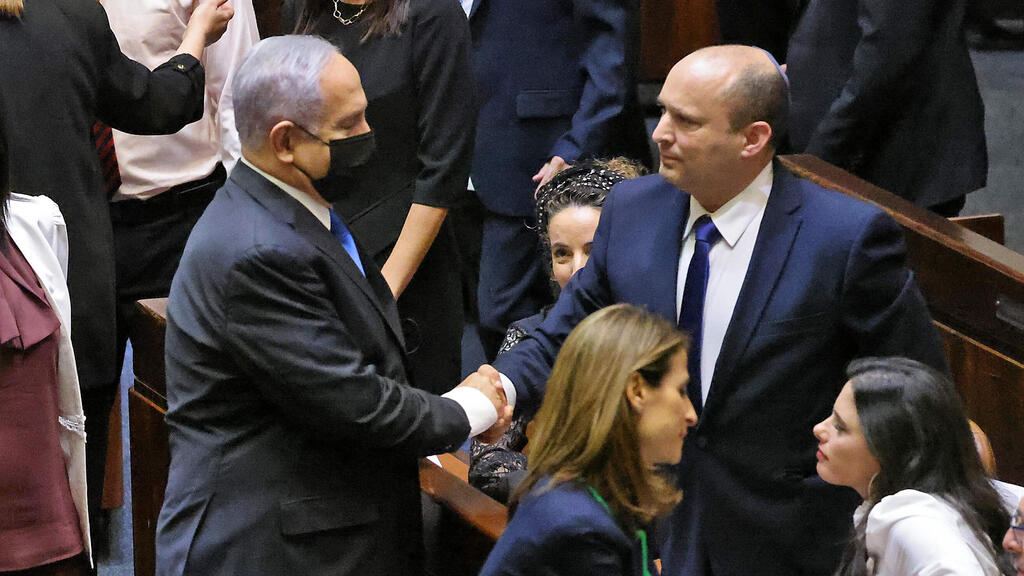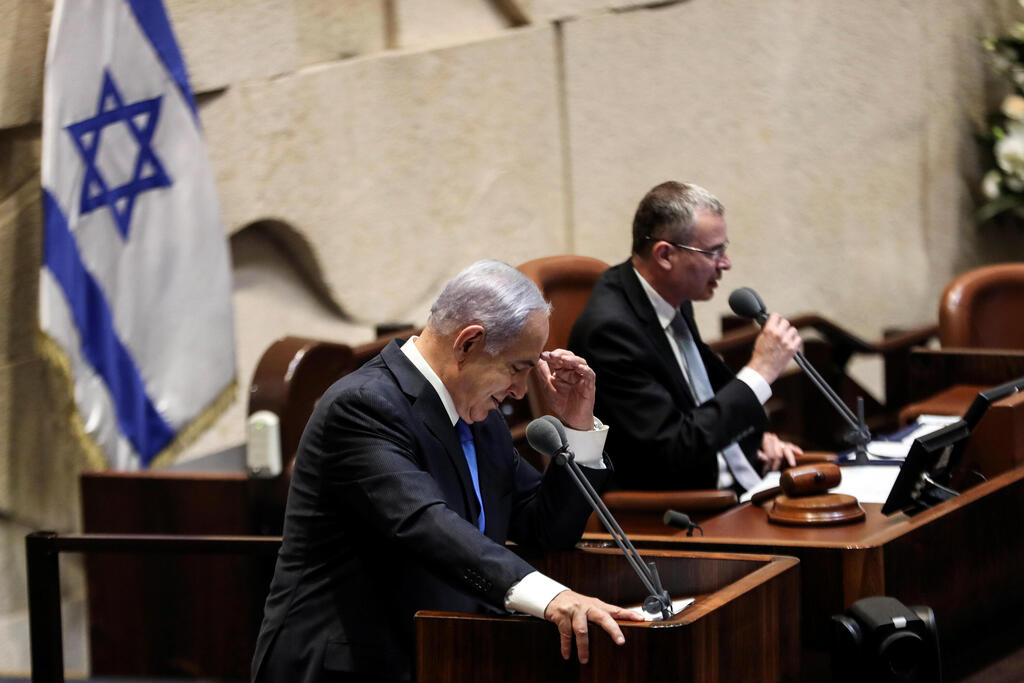Getting your Trinity Audio player ready...
For the first time in 12 years, Israelis on Monday woke up to a new government and a new prime minister after Naftali Bennett secured the backing of Knesset and replaced longtime leader Benjamin Netanyahu.
But as the new government gathered Monday morning for the traditional festive photo with the president, Netanyahu's allies were striking a note that sounded all too familiar to Americans in the wake of Donald Trump's refusal to accept his November 2020 defeat by U.S President Joe Biden.
5 View gallery


Benjamin Netanyahu shakes the hand of his successor Naftali Bennett as he was confirmed as the next prime minister on Sunday night
(Photo: AFP)
On Sunday night, Netanyahu stayed in Knesset for the voting to confirm the new government, briefly shook Bennett's hand and then departed immediately before the coalition to replace him was sworn in.
Netanyahu also declined to hold the usual formal ceremony for transfer of power, choosing instead to meet privately with Bennett on Monday.
Similarly, Bennett's home has not been fitted with the all-important "red telephone," the secure means of communication used by all Israeli prime ministers, as Netanyahu's staff had declined to make any preparations to transfer power to his replacement.
Despite the role of the National Security Council in preparing for a new prime minister, its members also claimed it was not their job to ready Bennett's ooffice.
5 View gallery


L-R: Finance Minister Avigdor Liberman, Defense Minister Benny Gantz, Foreign Minister Yair Lapid and Prime Minister Naftali Bennett meeting for the first time Sunday night
(Photo: AP)
Bennett, 49, a former ally of Netanyahu turned rival, became prime minister after a 60-59 vote in Knesset on Sunday. Bennett will hold office for two years, and will be replaced by Foreign Minister Yair Lapid, the architect of the coalition.
Likud MK David Bitan, an ally of the former prime minister, told Kan public radio on Monday that Netanyahu was not holding the handover ceremony because he feels “cheated” by the formation of the Bennett-Lapid government and “doesn’t want to give even the slightest legitimacy to this matter.”
Topaz Luk, a Netanyahu aide, told Army Radio that the former prime minister will “fight this dangerous and horrible government” as opposition leader.
“He’s full of motivation to topple this dangerous government as soon as possible,” Luk said of the former prime minister.
Netanyahu has expressed outrage over the formation of the new government, which largely consists of his former political partners.
5 View gallery


Israel's 36th government gathers for its official photo with Presidential Reuven Rivlin at his Jerusalem residence Monday
(Photo: AP)
In May, he hit back at Bennett when he announced he would enter a coalition with Lapid, accusing him of orchestrating the "scam of the century."
"All that Bennett cared about was becoming prime minister," Netanyahu said at the time, despite having offered both the new premier and his coalition partner Gideon Saar a power-sharing deal that both declined.
In a speech in the Knesset ahead of Sunday night's vote to confirm the new government, Netanyahu lambasted his replacements and vowed to lead his Likud Party back to power.
5 View gallery


Former prime minister Benjamin Netanyahu addresses Knesset on Sunday night, shortly before he was voted out of power by lawmakers
(Photo: Reuters)
"If it is destined for us to be in the opposition, we will do it with our backs straight until we topple this dangerous government and return to lead the country in our way," he said.
To his supporters, Netanyahu is a global statesman uniquely capable of leading the country through its many security challenges.
But to his critics, he has become a polarizing and autocratic leader who used divide-and-rule tactics to aggravate the many rifts in Israeli society.
Those include tensions between Jews and Arabs, and within the Jewish majority between his religious and nationalist base and his more secular and dovish opponents.
Bennett said he is prioritizing mending the many rifts dividing Israeli society.
5 View gallery


Prime Minister Naftali Bennett, right, and Foreign Minister Yair Lapid in Knesset on Sunday
(Photo: Reuters)
Trump falsely claims to this day that the November 2020 presidential election was "rigged" and that he had only been beaten due to widespread voting fraud.
He declined to attend Biden's inauguration in January, which took place two weeks after Trump supporters violently stormed the Capitol, the U.S. seat of power, demanding that the Republican be returned to office.

